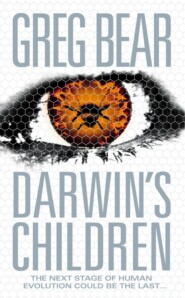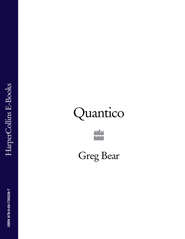По всем вопросам обращайтесь на: info@litportal.ru
(©) 2003-2024.
✖
Darwin’s Radio
Настройки чтения
Размер шрифта
Высота строк
Поля
The innkeeper smiled nervously. She had been nervous since they arrived.
Kaye carried her bag outside. The UN team had assembled, six men and three women. Kaye stood beside a Canadian woman named Doyle, while Hunter brought out the satellite phone.
First Kaye made a call to Tbilisi to speak with Tamara Mirianishvili, her main contact at the institute. After several tries, the call went through. Tamara sympathized and wondered what the fuss was about, then said Kaye was welcome to come back and stay a few more days. ‘It is shameful, to push your nose into this. We’ll have fun, make you cheerful again,’ Tamara said.
‘Have there been any calls from Saul?’ Kaye asked.
‘Twice he calls,’ Tamara said. ‘He says ask more about biofilms. How do phage work in biofilms, when the bacteria get all socialized.’
‘And are you going to tell us?’ Kaye asked in jest.
Tamara gave her a tinkling, sunny laugh. ‘Must we tell you all our secrets? We have no contracts yet, Kaye dear!’
‘Saul’s right. It could be a big issue,’ Kaye said. Even at the worst of times, Saul was on track with their science and their business.
‘Come back, and I’ll show you some of our biofilm research, special, just because you are nice,’ Tamara said.
‘Wonderful.’
Kaye thanked Tamara and handed the phone back to the corporal.
A Georgian staff car, an old black Volga, arrived with several army officers, who exited on the left. Major Chikurishivili of the Security Forces stepped out of the right side, his face stormier than ever. He looked like he might explode in a cloud of blood and spit.
A young army officer – Kaye had no idea what rank – approached Beck and spoke to him in broken Russian. When they were finished, Beck waved his hand and the UN team climbed into their jeeps. Kaye rode in the jeep with Beck.
As they drove west out of Gordi, a few of the townspeople gathered to watch them leave. A little girl stood beside a plastered stone wall and waved: brown-haired, tawny, gray-eyed, strong and lovely. A perfectly normal and delightful little girl.
There was little conversation as Hunter drove them south along the highway, leading the small caravan. Beck stared thoughtfully ahead. The stiff-sprung jeep bounced over bumps and dropped into ruts and swerved around potholes. Riding in the right rear seat, Kaye thought she might be getting carsick. The radio played pop tunes from North Ossetia and pretty good blues from Azerbaijan and then an incomprehensible talk show that Beck occasionally found amusing. He glanced back at Kaye and she tried to smile bravely.
After a few hours she dozed off and dreamed of bacterial buildups inside the bodies within the trench graves. Biofilms, what most people thought of as slime: little industrious bacterial cities reducing these corpses, these once-living giant evolutionary offspring, back to their native materials. Lovely polysaccharide architectures being laid down within the interior channels, the gut and lungs, the heart and arteries and eyes and brain, the bacteria giving up their wild ways and becoming citified, recycling all; great garbage dump cities of bacteria, cheerfully ignorant of philosophy and history and the character of the dead hulks they now colonized and reclaimed.
Bacteria made us. They take us back in the end. Welcome home.
She woke up in a sweat. The air was getting warmer as they descended into a long, deep valley. How nice it would be to know nothing about all the inner workings. Animal innocence; the unexamined life is the sweetest. But things go wrong and prompt introspection and examination. The root of all awareness.
‘Dreaming?’ Beck asked her as they pulled over near a small filling station and garage clapped together from sheets of corrugated metal.
‘Nightmares,’ Kaye said. ‘Too much into my work, I guess.’
CHAPTER FIVE Innsbruck, Austria (#ulink_4b8444a9-cb91-5b80-bcb5-8230c2e2e9c5)
Mitch saw the blue sun swing around and darken and he assumed it was night, but the air was dim green and not at all cold. He felt a prick of pain in his upper thigh, a general sense of unease in his stomach.
He wasn’t on the mountain. He tried to blink the gunk from his eyes and reached up to rub his face. A hand stopped him and a soft female voice told him in German to be a good boy. As she wiped his forehead with a cold damp cloth, the woman said, in English, that he was a little chapped and his nose and fingers were frostbitten and that he had a broken leg. A few minutes later he went to sleep again.
No time at all after that, he awoke and managed to sit up in a crisp, firm hospital bed. He was in a room with four other patients, two beside him and two across from him, all male, all less than forty years old. Two had broken legs in movie-comedy slings. The other two had broken arms. Mitch’s own leg was in a cast but not in a sling.
All the men were blue-eyed, wiry, handsome in an aquiline way, with thin necks and long jaws. They watched him attentively.
Mitch saw the room clearly now: Painted concrete walls, white enamel bed frames, a portable lamp on a chromed stand that he had mistaken for a blue sun, mottled brown tile floor, the dusty smell of steam heat and antiseptic, a general odor of peppermint.
On Mitch’s right, a heavily snow-burned young man, skin peeling from his baby-pink cheeks, leaned over to say, ‘You are the lucky American, are you not?’ The pulley and weights on his elevated leg creaked.
‘I’m American,’ Mitch croaked. ‘I must be lucky because I’m not dead.’
The men exchanged solemn glances. Mitch could see he had been a topic of conversation for some time.
‘We all agree, it is best for fellow mountaineers to inform you.’
Before Mitch could protest that he was not really a mountaineer, the snow-burned young man told him that his companions were dead. ‘The Italian you were found with, in the serac, he is broken-neck. And the woman is found much lower down, buried in ice.’ Then, his eyes sharply inquisitive – eyes the color of the wild-dog sky Mitch had first seen over the arête – the young man asked, ‘The newspapers say, the TV say. Where did she get the little corpse baby?’
Mitch coughed. He saw a pitcher of water on a tray by his bed and poured a glass. The mountaineers watched him like athletic elves trussed up in their beds.
Mitch returned their gazes. He tried to hide his dismay. It did him no good to judge Tilde now; no good at all.
The inspector from Innsbruck arrived at noon and sat beside his bed with an attending local police officer to ask questions. The officer spoke better English and translated for him. Their questions were routine, the inspector said, all part of the accident report. Mitch told them he did not know who the woman was, and the inspector responded, after a decent pause, that they had all been seen together in Salzburg. ‘You and Franco Maricelli and Mathilda Berger.’
‘That was Franco’s girlfriend,’ he said, feeling sick, trying not to show it. The inspector sighed and pursed his lips disapprovingly, as if this was all very trivial and only a little irritating.
‘She was carrying the mummy of an infant. Perhaps a very old mummy. You have no idea where she got it?’
He hoped the police had not gone through his effects and found the vials and recognized their contents. Perhaps he had lost the pack on the glacier. ‘It’s too bizarre for words,’ he said.
The inspector shrugged. ‘I am not an expert on bodies in the ice. Mitchell, I give you some fatherly advice. I am old enough?’
Mitch admitted the inspector might be old enough. The mountaineers did not even attempt to hide their interest in the proceedings.
‘We have spoken to your former employers, the Hayer Museum, in Seattle.’
Mitch blinked slowly.
‘They tell us you were involved in the theft of antiquities from the federal government, the skeletal remains of an Indian, called Pasco Man, very old. Ten thousand years, found on the banks of the Columbia River. You refused to hand over these remains to the Army Corpse of Engineers.’
‘Corps,’ Mitch said softly.
‘So they arrest you under an antiquities act, and the museum fires you because there is so much publicity.’
‘The Indians claimed the bones belonged to an ancestor,’ Mitch said, his face flushing with anger at the memory. ‘They wanted to bury them again.’
The inspector read from his notes. ‘You were denied access to your collections in the museum, and the bones were confiscated from your house. With many photographs and more publicity.’
‘It was legal bullshit! The Army Corps of Engineers had no right to those bones. They were scientifically invaluable –’
‘Like this mummified baby from the ice, perhaps?’ the inspector asked.
Mitch closed his eyes and looked away. He could see it all very clearly now. Stupid is not the word. This is fate, pure and simple.
‘You are going to throw up?’ the inspector asked, backing away.









